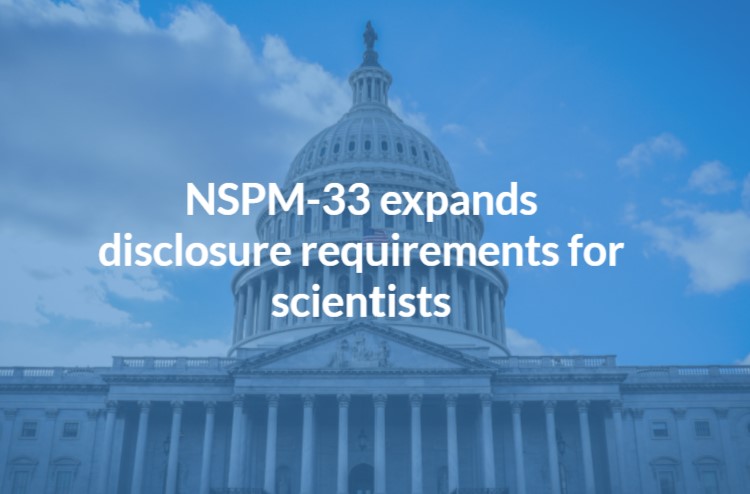We’ve been keeping tabs on recent policy changes in Washington that directly affect research organizations, and NSPM-33 could have a significant impact on administrative burden. If you’re not familiar with the proposed policy, read on for an overview of the policy and its potential impact.
What is NSPM-33?
During the final days of the Trump administration, the White House issued the National Security Presidential Memorandum-33, which presented new disclosure requirements for scientists. While reserving the right to amend the requirements in future, the Biden administration is moving ahead with NSPM-33, amidst much debate within the science community.
While scientists already report extensively on their biographical and financial information when applying for grants, NSPM-33 seeks to establish minimum standards for the information collected across all organizations.
Policymakers are keen to prioritize enhanced disclosure in a bid to avoid working with scientists who have problematic ties to foreign institutions and could covertly share intellectual property. Concerned that foreign governments are actively trying to steal data and intellectual property from US institutions, NSPM-33 is designed to mitigate the risk of disclosure violations. These violations have previously led to the sanctioning and even arrest of US-based scientists who were found to have undisclosed ties abroad.
Of course, foreign interference at universities is a global concern and, in October2020, Universities UK, a collection of 140 universities in the UK, called for new steps to protect research security.
What’s the debate?
The regulations proposed by NSPM-33, which include disclosure of foreign financial support, can be difficult to fulfil alongside other disclosure responsibilities, such as conflict-of-interest statements.
The Council on Government Relations (COGR) is aware that some of its member institutions have concerns about “the time and burden associated with collecting and uploading contracts/agreements and privacy concerns related to nondisclosure or confidentiality requirements in those agreements.”
Some researchers are protesting against the politicization of their processes, while a petition to the Office of Science and Technology Policy, signed by the Association of American Universities and other prestigious organizations, asks the OSTP to “consult with the academic research community – preferably through a public comment period – before deciding whether and how to move ahead with NSPM-33.
What impact might NSPM-33 have on your organization? Join the conversation at our Cayuse Connect Community. We’ve got a conversation thread going and we want to hear your response to the NSPM-33 disclosure requirements.


